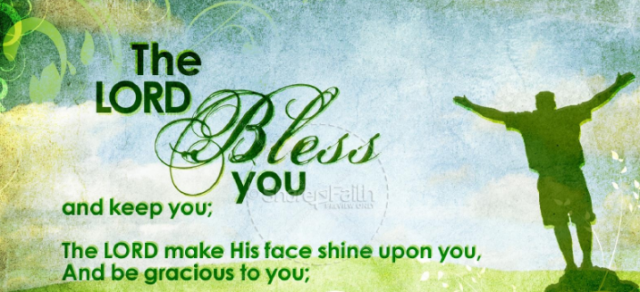
Dear Gideons
A few years ago I wrote to thank you on behalf of our son for the New Testament you placed in his hands at the beginning of his first year in secondary school.
Three years later as he moves into Year 10 that New Testament is still his most treasured possession and well read. He has other Bibles, but that one goes pretty much everywhere and he reads it at night. He has since left that school and attends a different secondary school however that visit and that gift was probably the most treasured and import life lines in what was otherwise a grim time at the previous school. The Lord is gracious, however, and he is now extremely happy in his new school and still walking with the Lord.
However, that isn’t the main reason I am contacting you. Once more it is to say a huge ‘thank you’.
My father, now in his late 70s, was admitted into hospital yesterday in Telford. As the years have gone by he has become very frail, has many medical conditions and although he loves the Lord still, has become increasingly stubborn and belligerent. He is also convinced that everything he reads in the press is true to the letter and as a consequence he has a completely irrational fear of hospitals.
After a long and tiring day of tests and admission procedures he arrived in the ward yesterday evening. As I was unpacking his bag, at the back of the locker I spotted a Gideons New Testament. And that is why I am emailing you.
I showed it to him and he became so excited and genuinely happy. I can’t say what a blessing that was. I have no idea if he will ever leave the hospital and if he does if he will ever go home but he was delighted to find that Bible yesterday.
So, could I say a huge ‘thank you’ to whoever placed those Bibles in that hospital. You helped settle a very awkward patient in a hospital he hates. That Bible brought him peace.
Please persevere with your work. It is tough in the public arena in the UK today but do know you are making a huge difference. Our Lord and Saviour is gracious, compassionate and loving. Above all He knows His own – even if they have turned into grumpy old men! His Word is precious and powerful and He makes a difference.
Thank you. May God bless you all mightily and keep you safe and cause His light to shine upon you all.
With all of our love and thanks
Amanda and Family
A Japanese language testament
The following encouragement was submitted by Bob Cooper of the Bournemouth of The Gideons a few weeks ago:
My wife Jane and I went to Richmond Park Church in Bournemouth recently to speak about the work of The Gideons. Like most Branches who visit churches we have a display and put out a range of our Bibles.
As we were chatting before the service we were introduced to an overseas student, Akihiro. He had wandered into the church a few weeks before and had been coming ever since. One of the church members came up and asked if it would be possible to have one of the Testaments that were on display as Akihiro didn’t have one of his own. He was Japanese and noticed the Bilingual Japanese/English Testament. We had seen this Testament when we put out the display but had no idea what language it was! Naturally we said yes.
We see the Lord’s hand in this. The timing was just right. A few weeks earlier he wouldn’t even have been there. We were there just at the time he needed a copy of God’s Word. Our Branch has never needed or asked for a Japanese Testament and have no idea where that Testament came from or how it got into our display materials. It just shouldn’t have been there!
We need to pray that as Akihiro reads his New Testament the Holy Spirit will work in his life and bring him to the Lord.
Then just this week, Bob emailed to say:
“Just to let you know that your prayers have been answered. Akihiro came to the Lord a couple of weeks ago and we had the joy of meeting him last week.”
Praise the Lord!
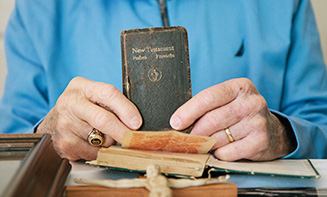
Everyone stay quiet
By mandy liebig
A smoky haze filled the North Korean forest. Minutes earlier, a barrage of mortar rounds struck the area, each one as deafening as it was destructive. William and his platoon were on the receiving end, and they were frantically trying to regroup. It was just before dawn and visibility was poor, but they could see soldiers moving in their direction. Whether they were friend or foe, it was impossible to tell. As they peered through the trees, one G.I. panicked and shouted, “Don’t shoot! We’re G.I.s!”
His cry was answered by the unmistakable sound of a machine gun bolt slamming forward. The noise gave William chills. He knew what that meant. “I immediately turned left and started up the face of the mountain,” he remembered. “I only got six or eight feet up before an extended burst of bullets sprayed the area. I felt a sharp pain in my right foot and knew I had been hit.” He stumbled, but two of his men grabbed him under the shoulders, and together they escaped up the rocky slope.
When William looked back, all of the G.I.s behind him were dead.
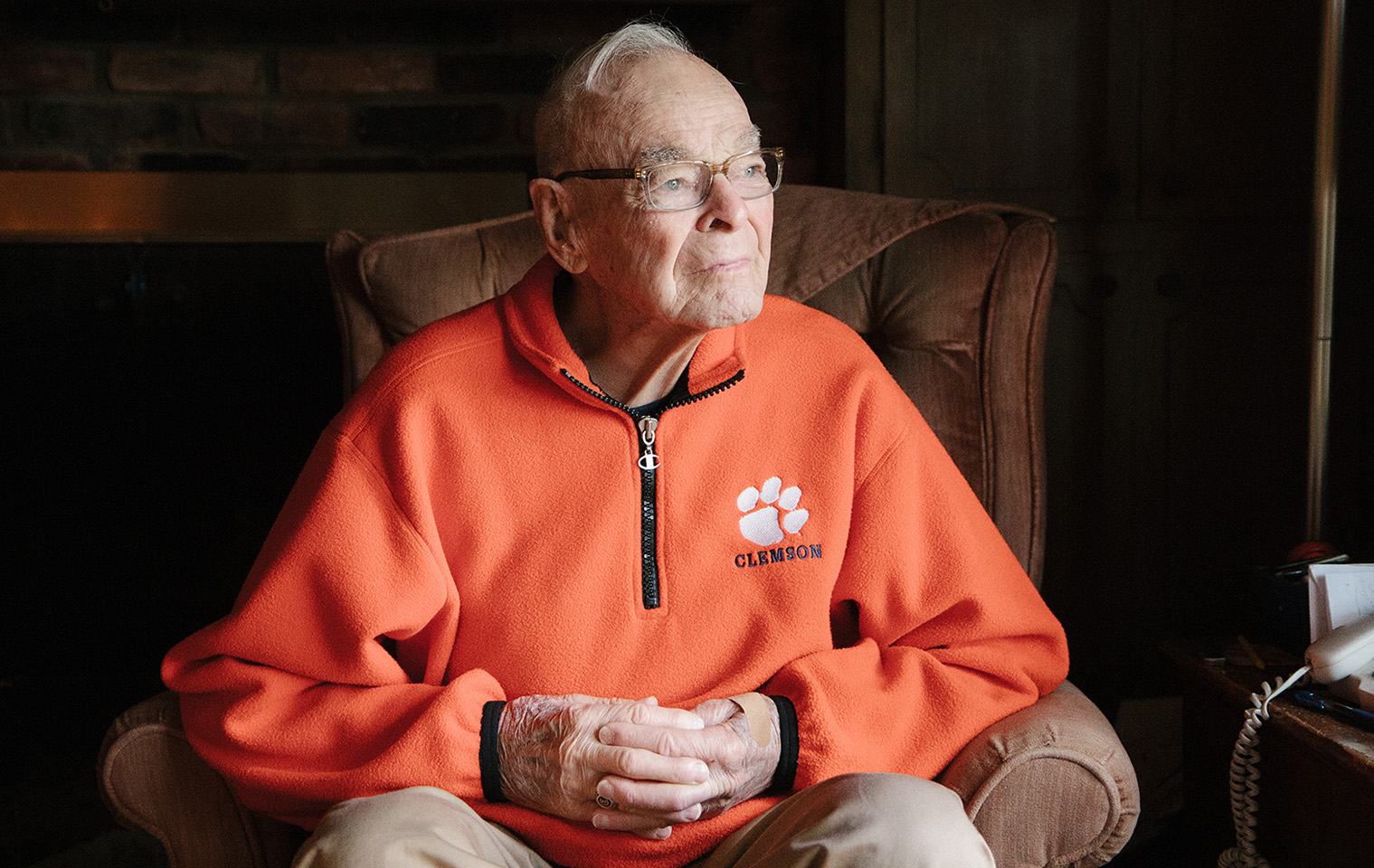
William Funchess grew up on a farm in Orangeburg County, South Carolina. The oldest of three children, his boyhood days were largely spent helping his father maintain their massive fields of cotton, corn, and peanuts. The work was hard, but rewarding, and William enjoyed it so much he planned to study agronomy in college.
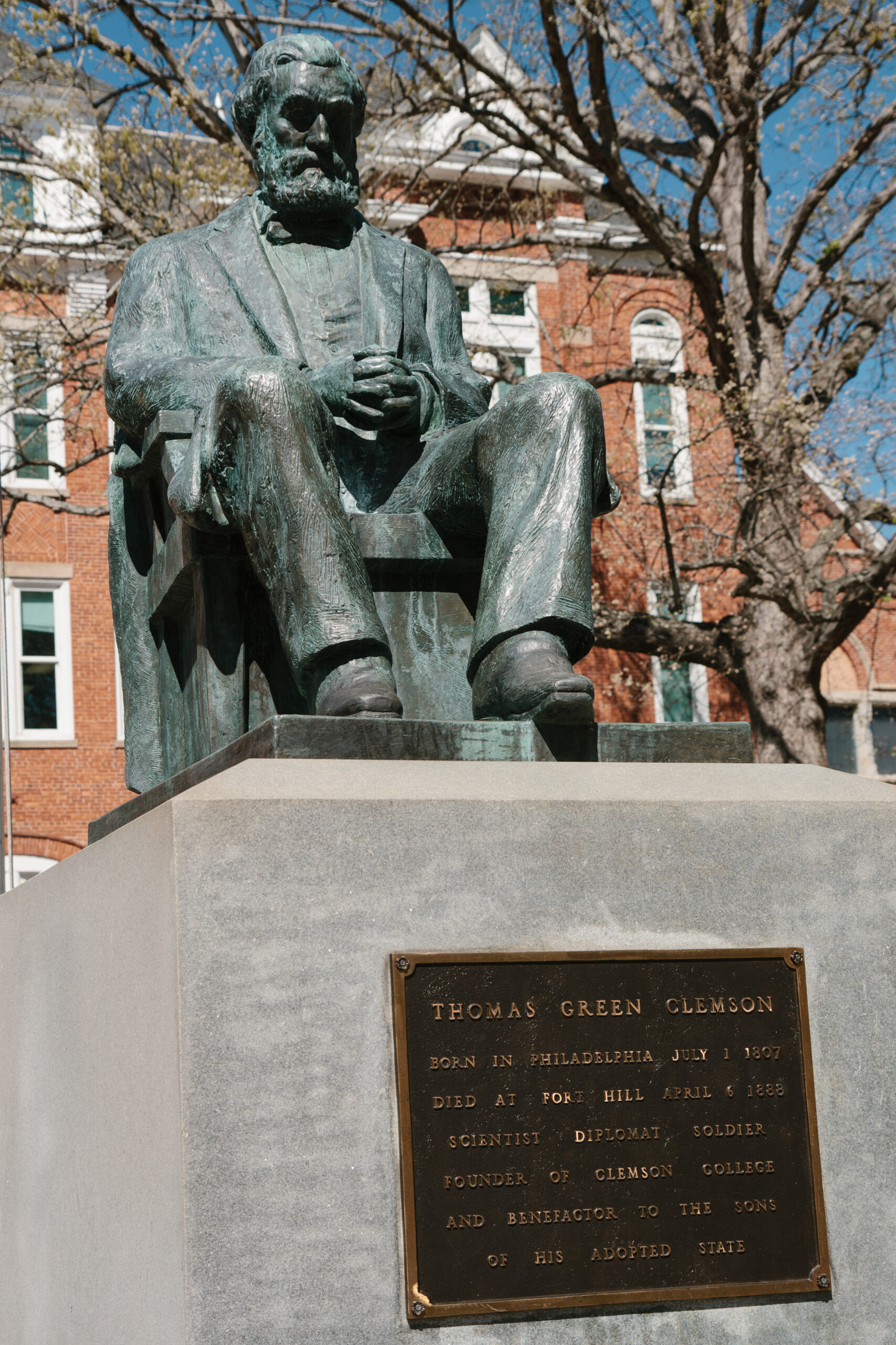 Statue of Thomas Green Clemson, founder of the college known today as Clemson University
Statue of Thomas Green Clemson, founder of the college known today as Clemson UniversityHe decided to attend Clemson College, a military college since its founding in 1889. By the time William graduated high school in 1944, the United States was assisting its allies in the Second World War, and William was unsure if he would be drafted before completing his education. So, he joined the Reserved Officers’ Training Corps program and received his first taste of military life.
In 1948, William received his diploma along with a commission as 2nd Lieutenant in the United States Army and an assignment to Fort Jackson. Shortly after, he was reassigned to a base in Japan. He was newly married to his high school sweetheart, Sybil, and the two were excited to embark on the adventure together.
But on Sunday, June 25, 1950, some 90,000 North Korean troops pushed across the 38th parallel, and the United States was once again called to war. William was on amphibious maneuvers near the southernmost island of Japan. He was immediately ordered back to base, and on July 4, the 19th Infantry Regiment boarded a Landing Ship Tank (LST) and set sail for Korea. “I thought it was only a police action,” said William. “On the LST we were happy, jubilant even. We thought, ‘we’ll be home in three or four weeks.’”
It didn’t take long after disembarking in South Korea for the G.I.s to realize the situation was far worse than anticipated. “We were in a desperate plight,” William recalled. “The South Korean army was in disarray, and they were fleeing from the Soviet trained and equipped North Korean Army. They had no means of stopping them.”
After the Battle of Pusan, William was promoted to 1st Lieutenant and given command of 1st Platoon, Company C. He was charged with orders to cross the border into North Korea. “We met relatively little resistance at first, but on November 4, 1950, just outside of the city of Anju, my men reported seeing Chinese soldiers crossing the river not far from us. I contacted battalion headquarters, but they assured me I was mistaken – there were no Chinese troops in North Korea.”
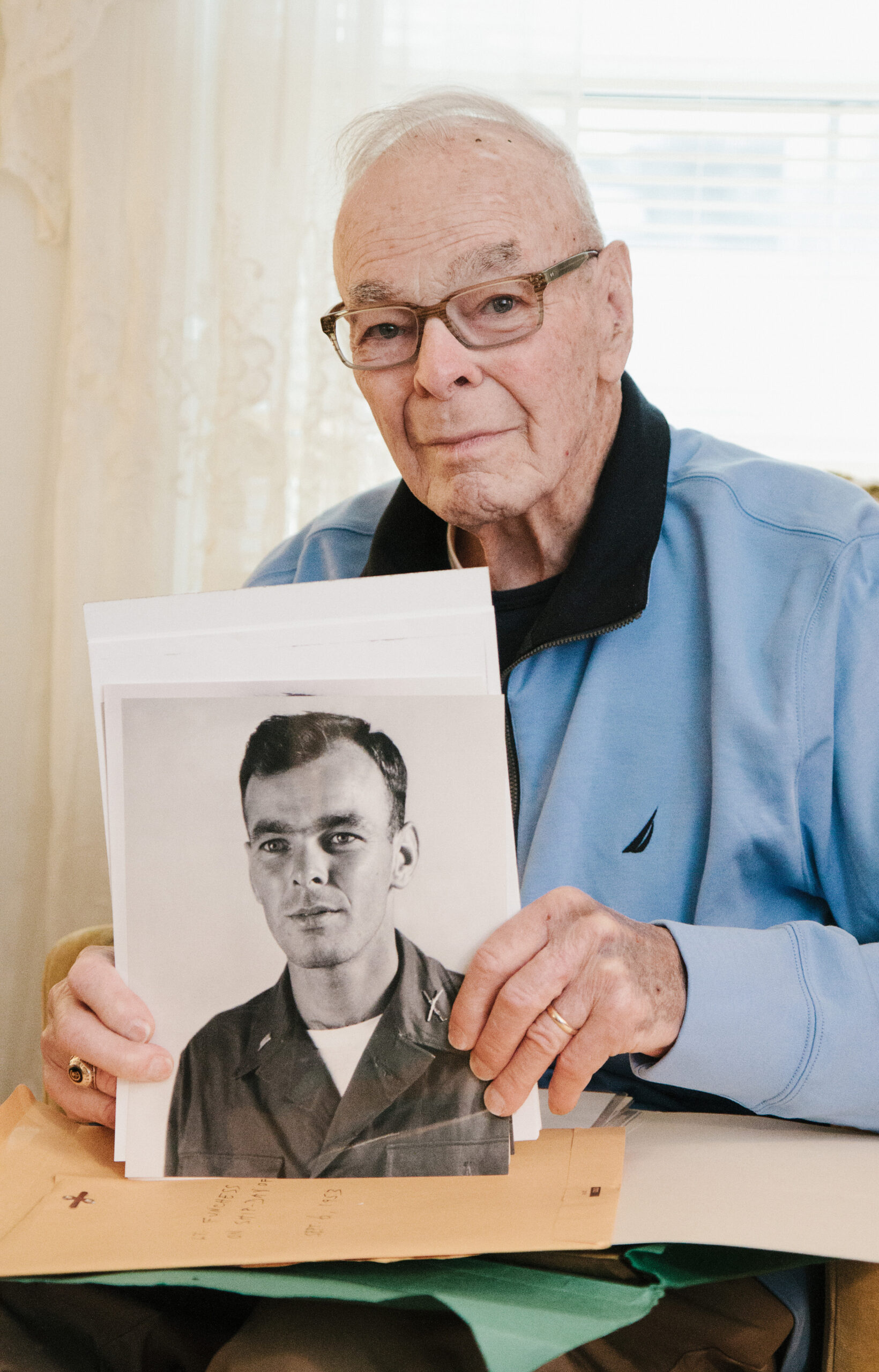
William led his platoon to a vantage point, hoping to confirm the reports were a mistake. Instead, he saw hundreds of enemy troops charging his position. “They were all in a fast trot. As they reached the river, they removed their shoes and clothing, held them above their heads, waded across the frigid, shoulder-deep water, and dressed again. In an instant, they were again in a fast trot,” said William.
Mortar and gunfire soon accompanied the attack, and before long, two men were helping a wounded William stumble up a mountainside in retreat. Suddenly, the man on William’s right was shot, and he fell back down the slope, taking William’s weapon with him. The G.I.s limped steadily on until they reached the edge of a deep canyon. They had two options: jump to certain death, or face the dozens of enemy soldiers forming a semi-circle around them. They decided to take their chances, and they surrendered.
As William shivered in the darkness,
he felt something in his chest pocket. It was a New Testament bearing the Gideon emblem.
William was searched by Chinese soldiers and added to the hundreds of prisoners of war (POWs) taken that day. As he sat among his fellow G.I.s, he contemplated the reality of his situation. “I realized many men in my platoon had either been killed or captured,” recalled William. “No immediate help and no counterattacks by the United States or South Korean armies were forthcoming. We were alone, and we were prisoners of a hostile enemy in a hostile country.”
As night approached, a bitter cold began to settle in. William shivered in the darkness, and as he clung to his thin summer jacket, he felt something in his chest pocket. It was a New Testament bearing the Gideon emblem, handed to him by an Army Chaplain shortly before he entered North Korea. The New Testament also included Psalms and Proverbs. “The first thing I did was open to Psalm 23,” said William. “When I was growing up, my mother always told me to read it when I was in trouble because it would give me a certain amount of peace and make me capable of handling any situation. I needed all the help I could get.”
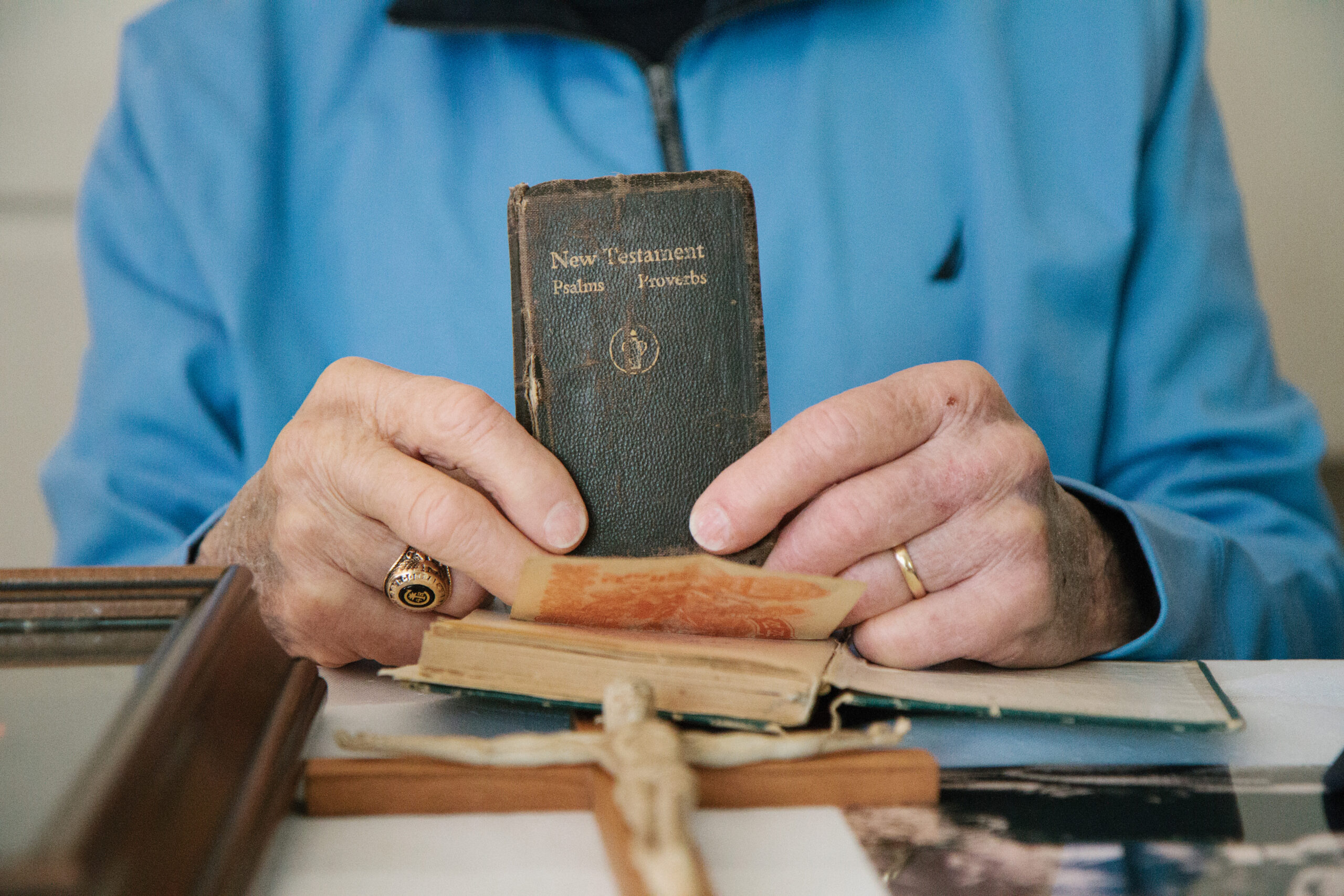
The POWs were forced to march north toward the city of Pyoktong. Snow was beginning to fall on the mountainous terrain, and the icy conditions made a hard journey all the more difficult. The bullet that tore through William’s right foot shattered several bones, and he struggled to keep up. “I fell hundreds of times. It wasn’t long before bruises covered both knees and both elbows. Frozen blood crusted both my sleeves and pant legs,” remembered William. “I was always the last man to enter the camp at night, but I knew that if I stopped they would execute me, and I wasn’t going to give up.”
The captives marched for seventeen nights before finally reaching their destination. It was a remote, snow-covered basin a few miles outside of Pyoktong. The only sign of civilization was a group of mud huts and shacks, which were connected by several dirt paths. The small community sat on the banks of the Yalu River. It was dark and uninviting, and the soldiers neither knew nor cared about the true name of the place.
They simply called it, “The Valley.”
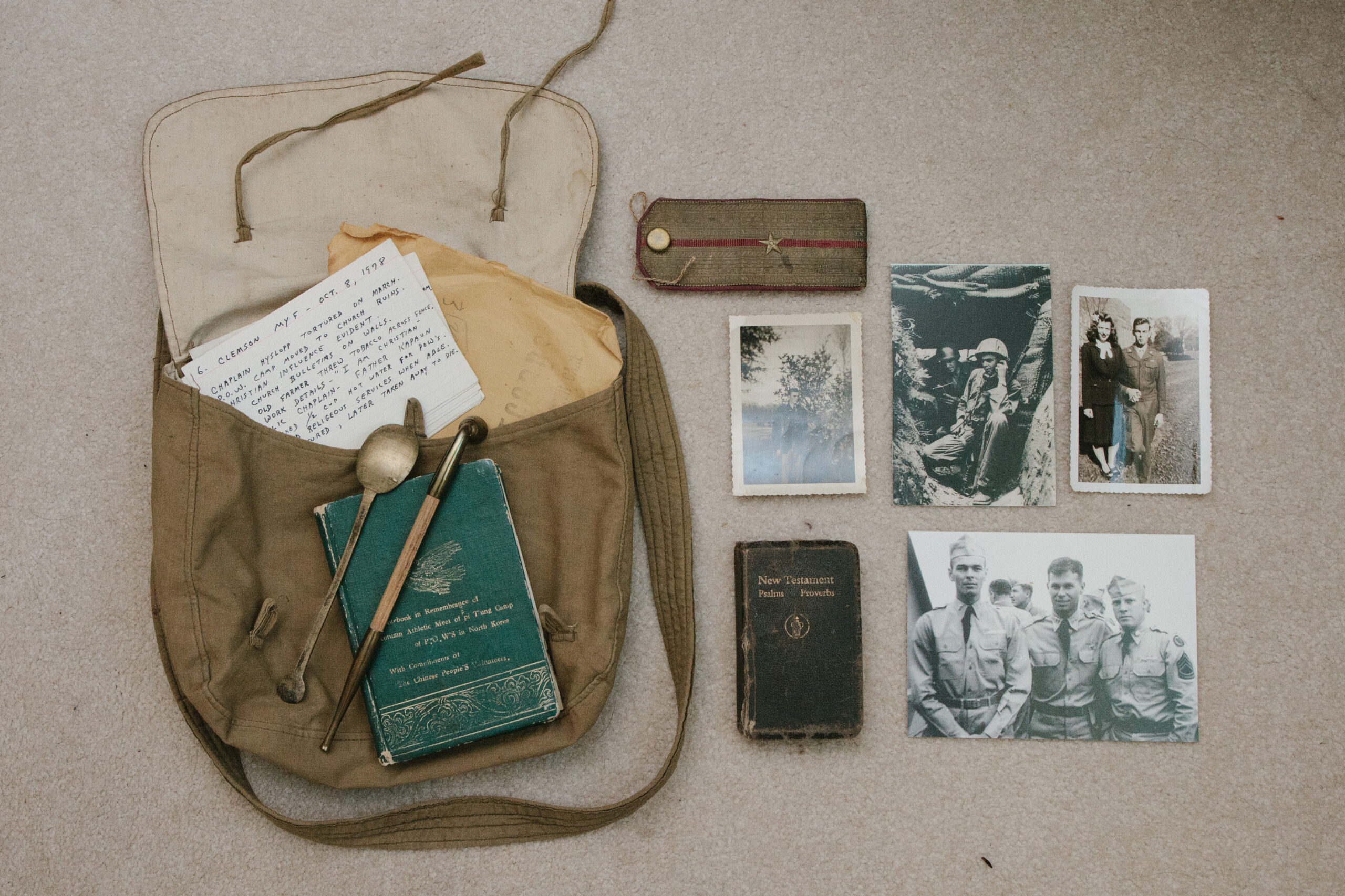
The POWs were divided amongst the dilapidated shacks. They found conditions to be primitive at best. There was no running water, no heat, and no blankets. Many men lost fingers and toes to frostbite. “There was nothing we could to do stay warm but to cling to each other,” recalled William. “Looking back, it’s a wonder any of us survived the first month.”
The shack that housed William also housed 11 other soldiers, all of whom were wounded. “They were the most downcast men I had ever seen. The men tried to be brave, but I heard sobbing at night,” he said. “Some called out for their mothers. There were screams when the wounds became too painful to bear. There were nightmares when they slept.”
As he lay among the men, William began to read from his New Testament. After a while, he asked the others if they would like him to read out loud. Each man replied with an enthusiastic yes, and William read Psalm 23 to the room. “When I finished, they asked, ‘please, read some more.’ So, I did.”
“I began to love my New Testament, and I was determined to not let the soldiers take it away from me.”
The words brought an extraordinary sense of peace to the room and somehow gave the men a respite from their suffering. William read to the soldiers every night, each time beginning with Psalm 23, and then continuing with other chapters in the New Testament. “Those men were so enthusiastic when I was reading. I began to love my New Testament, and I was determined to not let the soldiers take it away from me,” said William.
The Chinese soldiers often searched for and discarded anything they considered contraband. On two occasions, William watched as his New Testament flew out the door of his shack and landed on a pile outside. If he were caught retrieving it, it would mean sever punishment or possible death, but William didn’t care. “When the guards weren’t looking,” he said, “I gently slid the New Testament with my foot farther away from the pile and stood on it until the inspection was over. Then, I leaned over, feigning exhaustion, and placed it in my pocket.”
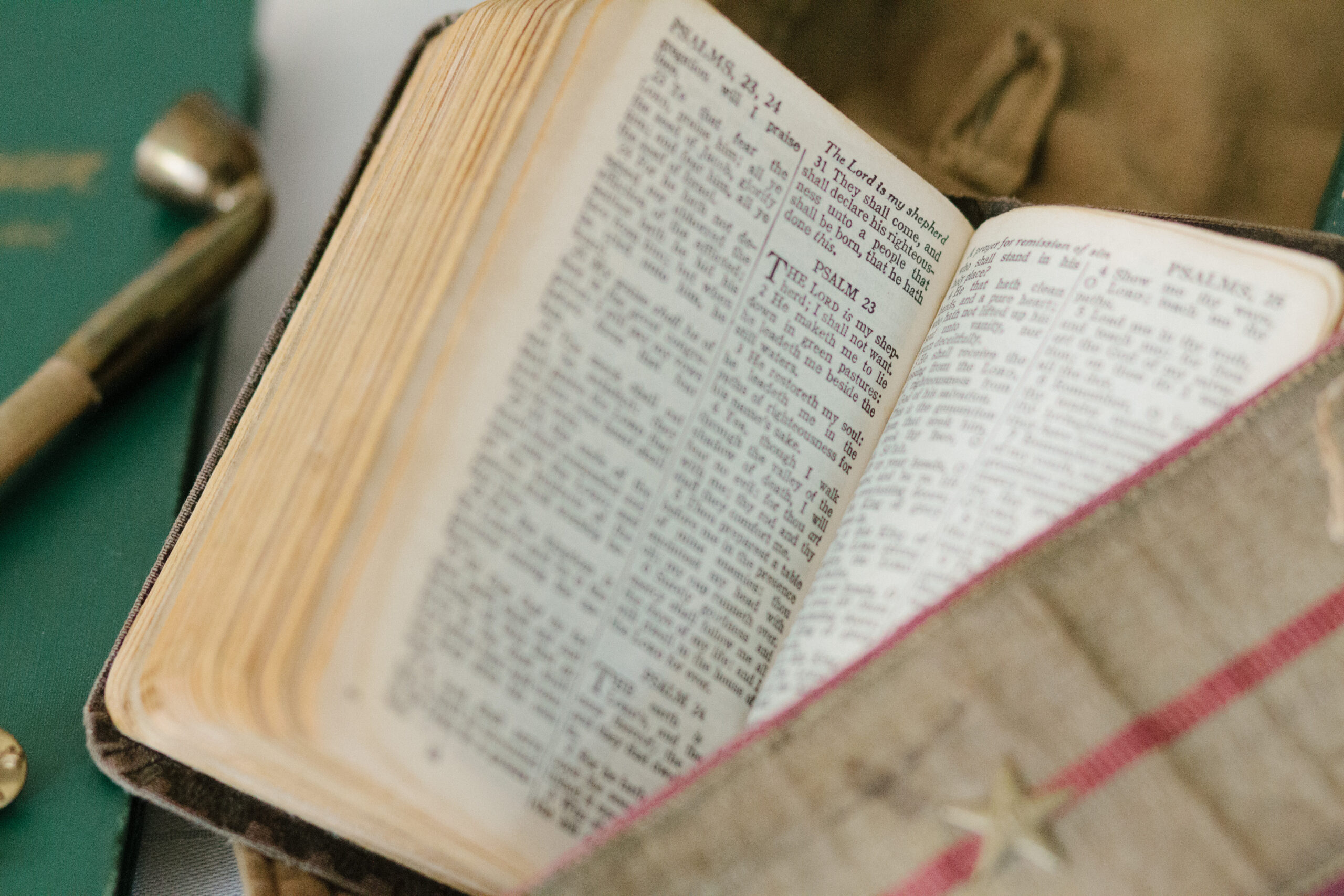
For William, his New Testament was more than just a book; it was a lifeline. He was held captive for 34 long and terrible months – nearly 3 years. He and his fellow prisoners suffered relentless interrogations, beatings, and humiliations. If they were able to walk, they were subjected to hard labor. Their diet consisted primarily of small portions of millet seed or sorghum. It wasn’t long before William weighed less than 100 pounds. The deplorable sanitary conditions were a breeding ground for vermin and lice, which soon found their way into beds, hair, and clothing. Many men attempted to escape. None succeeded.
“My New Testament was a connection to home, and more than that, it was a connection to God. It gave all of us a feeling of great comfort,” William remembered. The Scripture reminded him of an omnipotent God whose goodness and mercy supersedes all evil, even the hostility of his enemies. He was not forgotten, and he was not alone. God was with him. He was stripped of all worldly comforts and denied his freedom, but he had an eternal hope that gave him the strength to survive. In the moments when it seemed easiest to give up, he remained resilient.
The POWs attended mandatory propaganda sessions designed to intimidate them into renouncing their countries and their faiths. “The Communists suppressed Christianity in every way possible,” recalled William. “It was as if they felt their battle was half won if we stopped believing.” But their tactics fell short. “They would say, ‘Where is your God now? Why don’t you ask your God to feed you? If you asked Stalin or Moa Tse-Tung to feed you, perhaps you would not be starving.’ Not one man asked Stalin or Moa to provide food. I was proud of the American soldier.”
“My New Testament was a connection to home, and more than that, it was a connection to God. It gave all of us a feeling of great comfort.”
Usually, William sat quietly and patiently until the session came to a close. One day, however, the Chinese brought out large black and white photos of the mass graves at the City of Anak. “I went into that city before I was captured,” said William. “They kept shouting, ‘this is proof of the atrocities committed by the Americans!’ I took it as long as I could, but then I stood and shouted that it was a lie. They asked how I knew, and I foolishly responded that I was there, and I saw what happened.”
The repercussions were immediate. Two guards grabbed William and dragged him to an isolated building. They had him undress and stand at attention outside. Inside, several North Korean officers held a trial, and William was the defendant.
The results of the trial were a mystery until September 5, 1953. The war was over, and an Armistice Agreement had been signed in July. Both sides agreed to release POWs over the course of a thirty-day period, and September 5 was the last day. “Each day I listened for my name, and each day I was disappointed,” said William. “I asked an officer, and he said the release was over. I asked, ‘How could it be over? I am still here!’ He replied, ‘You are not a POW. You are a war criminal and you will not be released.’”
When William asked what he did, the officer responded, “Remember Anak?” Suddenly, it all made sense and William returned to his room, devastated. He had been found guilty of war crimes in Anak, even though he was innocent. What would happen now? He envisioned being locked in a dark prison, never to be seen or heard from again. But rather than dwell on those thoughts, he opened his New Testament and prayed for a miracle.
The next day, soldiers loaded him into the back of a truck. William was imagining where they might be taking him when the truck stopped abruptly, and he was ordered to get out. They shouted at him to start walking into an open field. “This is it,” thought William. He anticipated a bullet in the back or the detonation of a land mine at any given moment. Yet, he kept putting one foot in front of the other, until he noticed a United States Army ambulance and two uniformed men waiting for him. When he climbed in the back, one of them patted his back and said, “You don’t know how lucky you are, son. Last night both sides agreed to release war criminals.”
William smiled. He was free at last.
But rather than dwell on those thoughts, he opened his New Testament and prayed for a miracle.
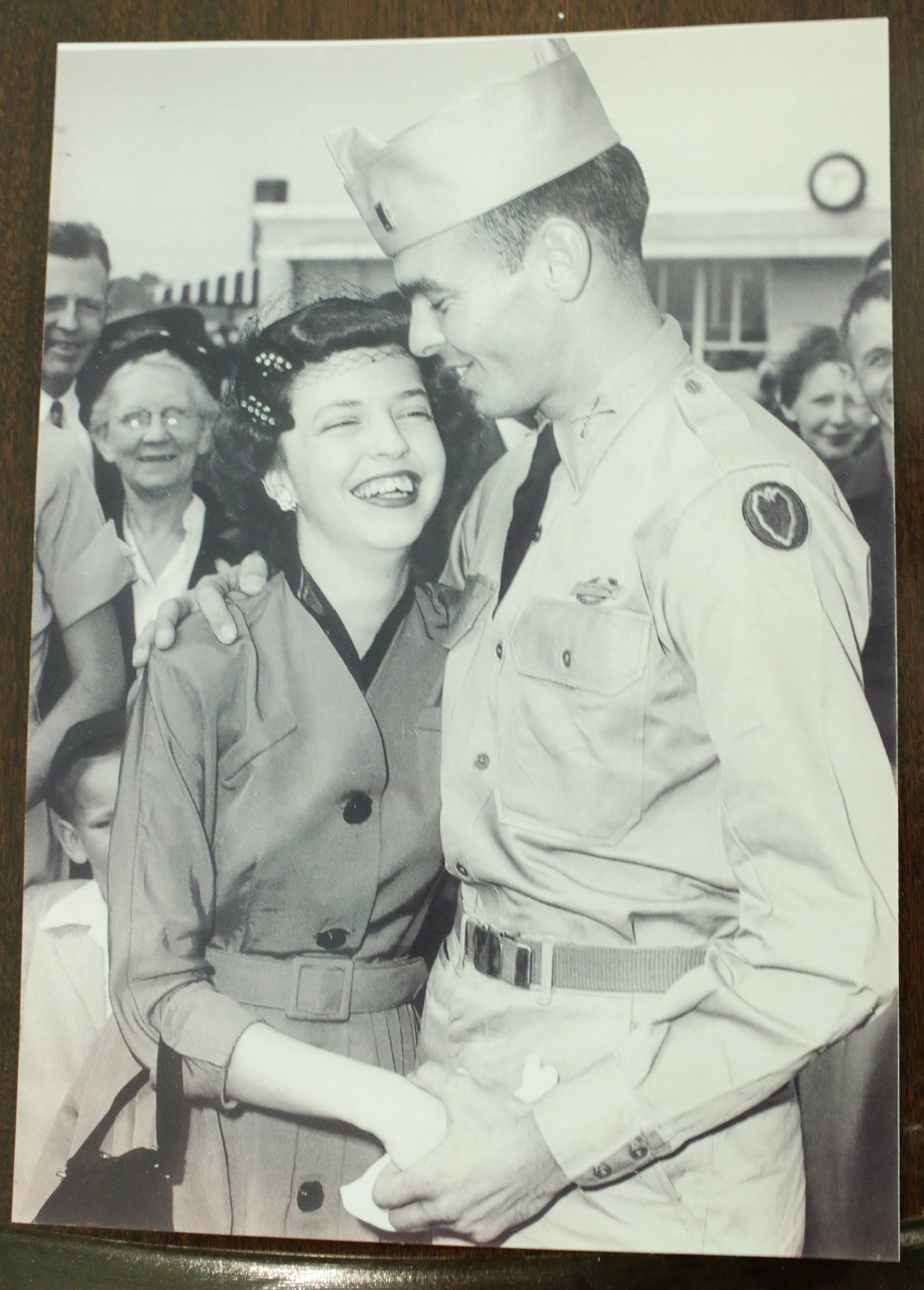 Sybil, William’s wife, excited to welcome him home
Sybil, William’s wife, excited to welcome him homeBy the time the plane carrying William home approached the airport in Columbia, South Carolina, a large crowd was gathered at the gate to welcome him home. In the front of the crowd, was Sybil. “She was wearing a bright red dress so I would be sure to see her, remembered William. “She was smiling and waving her hand.”
On January 20, 1954, the day after he was released from the hospital, William was separated from military service. “It was time to start a new life,” he said.
William went back to Clemson to earn his master’s degree in agronomy, and he worked over 30 years as a District Extension Leader and Associate Professor for the Clemson Extension Service. He and Sybil had three children, and they celebrated 67 wonderful years of marriage together before her passing in May 2017. In both hardship and happiness, William approached each circumstance with the same grit and faithfulness that saw him through his time as a prisoner of war. Today, he remains confident in the promise found in the New Testament and the assurance found in the words of Psalm 23:
The Lord is my shepherd; I shall not want.
He maketh me to lie down in green pastures: he leadeth me beside the still waters.
He restoreth my soul: he leadeth me in the paths of righteousness for his name’s sake.
Yea though I walk through the valley of the shadow of death, I will fear no evil:
for thou art with me; thy rod and thy staff they comfort me.
Thou preparest a table before me in the presence of mine enemies: thou anointest my head with oil; my cup runneth over.
Surely goodness and mercy shall follow me all the days of my life: and I will dwell in the house of the Lord for ever.
Telling the gospel after church
I was doing a Gideon presentation at Cherith Christian Fellowship in Wycombe last week and there was a man in his 30s loitering about outside before the service. He was looking at the notice board then wandered off before coming back to the board. He was approached by one of the elders to try and help. The man said he doesn’t go to church and had not been in one since childhood but he asked, “what’s it about today anyway?” When he was told that it was a talk about The Gideons, he replied that he had heard of them and so would come in to the service.
He sat there very attentive all throughout the service and afterwards he spoke at length to the elder who had invited him in. He was then pointed in my direction and, after quite a chat, he prayed with me and gave his heart to the Lord! Praise God! I thought you would be encouraged and blessed by that – I certainly was!
Every blessing
Andrew, Member of the Bucks South Branch of The Gideons
Gideon testimony at baptism
Dear Gideons,
Yesterday [18 June] I was baptised and had the opportunity to share the story of how God brought me to Him. A key part of this story was reading a Gideons New Testament that I was given at school, through which God showed me the truth.
I’d like to thank you for providing me with a copy of God’s Word, which truly is His power to save lives.
I hope this example of God’s work in my life encourages you to continue providing copies of God’s Holy Word to people all over the world.
I pray that God will continue to strengthen you in this wonderful work that you are doing.
In Christ,
Rose
Guided by a little red book
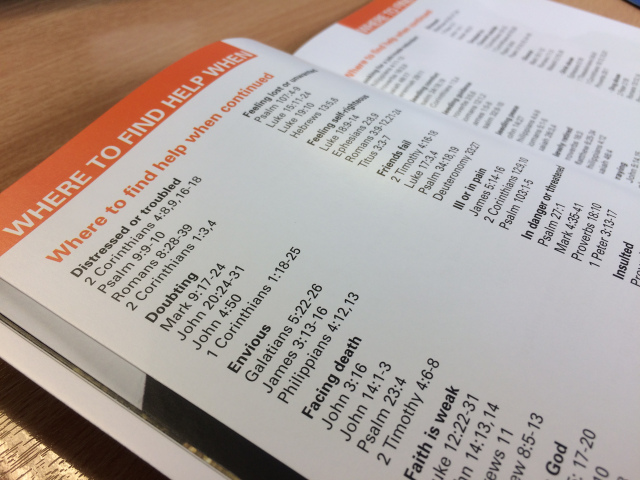
As a child I grew up in a home where faith wasn’t really discussed. My closest interaction with faith was the fact that I attended the nearest primary school to our house, a Church of England School. I always believed in God but had no real source of information, no one around me was a Christian to ask.
I am not sure if it was my primary school where I inherited ‘my little red New Testament and Psalms Gideon book’ (judging by my very childish handwriting most probably) but that little red book was to be my go to guide all throughout my childhood, my teens, and has continued to be my go to guide ever since!
It was that little red book that really brought me closer to God and connected me to Christianity when I had no one else to tell me about Jesus. In my early teens I started attending church with a school friend but a serious road accident that my church friends were in meant most of my friends were hospitalised. I fell away from attending my newly discovered church whilst they recovered in hospital.
But I still had my little red book!
The book took me through various aspects of my life – if I felt lonely, or afraid, or even if I needed to find a job – there would be a quick go to guide at the front of the book!
Years on and I’m now a regular church attending Christian, working in a church and singing the Gospel as part of a trio. Now with more than a few Bibles in my household I still use my Gideons New Testament and I use it to give others a verse when they are in need. Sitting in the busy reception of a church I often see many who are going through something!
I like to take my little red book on holiday, in fits just nice in my suitcase. The simplicity of the Gideons book really meant that even before I gathered the courage to attend a church I had somewhere to go and that simplicity still encourages me to find a verse for myself or others.
The Gideons book for me is more than just a little red book. It was the only place I could learn about Jesus and I have used it to tell more than a few others about Jesus too!
God bless you and your amazing simple but simply amazing ministry.
Juliette
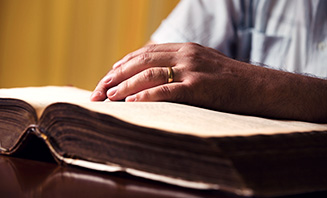
Reclaiming the Lost Art of Biblical Meditation
Guest contributor
Nothing else I’ve done has helped me as much as Scripture memory and Biblical meditation. When I’m in the grip of worry, I turn to my internalized passages and begin repeating them to myself. When I don’t know what to say to another, I recall a passage to quote. When unsure of a decision, I let the Word of God circulate through my brain, and insight always comes. When traveling by air, tired, eyes blurry, I can lean against the window of the plane, close my eyes, and start reciting God’s Word verse by verse. Each passage is timely and timeless, affordable and invaluable, faultless and fathomless, purer than gold and sweeter than honey.
Many Christians in America and around the world are forfeiting the habits of Biblical memorization and meditation. Three reasons are to blame:
- People have never been so busy. The digital revolution has propelled us into a constant state of urgency, and we’ve lost the stillness that accommodates memorization and meditation.
- We have total and constant access to Scripture. We have Bibles on our smartphones and multiple printed copies at home, so we no longer feel a need to memorize it.
- The eastern mystics have popularized a transcendental form of meditation, and many Christians are afraid to even use the word “meditation,” though it occurs repeatedly in the Bible. Recently a woman told me she wasn’t going to read my book, Reclaiming the Lost Art of Biblical Meditation, because meditation was “new age” and evil. Even when I pointed out what the Bible said about meditation, she remained unconvinced.
Biblical meditation is very different from the New Age techniques of the world. Biblical meditation is letting the Word of Christ dwell in us richly. It’s the powerful habit of pondering, personalizing, and practicing Scripture. Meditation is the process by which God’s thoughts become our thoughts, letting us see things in His terms, from His perspective, with His wisdom.
The Bible Expects Us to Meditate on Its Words
Meditation isn’t simply a helpful technique. It’s a Biblical requirement. We’re commanded to fill our minds with Scripture and ponder it constantly. When Joshua was commissioned to lead Israel to conquer the Promised Land, God gave him a simple battle plan: “This book of the Law shall not depart from your mouth, but you shall meditate on it day and night, so that you may be careful to do according to all that is written in it. For then you will make your way prosperous, and then you will have good success.” (Joshua 1:8).
Joshua only had a portion of God’s Word, the books of Moses. But the Lord told him to spend his days and nights thinking about everything written in Genesis, Exodus, Leviticus, Numbers, and Deuteronomy, and, having read and meditated on it, to obey it. That was his key to victory.
How Do We Meditate?
Meditation begins with hearing, reading, and studying Scripture. Memorization isn’t absolutely necessary because we can meditate on a passage with an open Bible before us. But Scripture memory makes meditation portable. Wherever we are, we can recall Scriptures we’ve learned by heart.
My own practice is simple. I spend a few minutes during my morning devotions learning or reviewing Scripture memory verses, which I’ve written down in a small loose-leaf notebook. Today, for example, I worked on re-memorizing 1 Corinthians 13, and I think soon I’ll have that passage nailed down for good.
As I wrote in my book, 100 Bible Verses Everyone Should Know By Heart, when we memorize Scripture it sinks into our conscious minds, into our subconscious thoughts, and even into our unconscious minds. It’s like burying a radiation chip in the middle of our brains. Even so, simply memorizing Bible verses is not enough. We meditate on Scripture with a view of putting it into practice in our attitudes, deeds, and words. As we internalize God’s inspired Word, it conveys wisdom, strength, guidance, and peace.
Recently a woman told me, “When I was eleven, a pastor visited our home with a Bible ministry on tape. I was interested in that; and from age eleven, I started listening to Bible tapes on an old reel-to-reel tape recorder. I heard many of Bible verses over and over again, and to this day I can recite many of those verses by heart. I was also encouraged to memorize Scripture and to keep a Promise Notebook.
“In my early twenties,” she said, “I faced a particular crisis and struggled to know what to do. I took many walks along a nearby river, and all those Scriptures flowed through my mind like water—that flood of Bible verses I’d learned in my childhood and teenage years. It was as if the Holy Spirit was shouting the truth of Scripture at me and I could do nothing to stop the flow of information, nor did I want to. There in my heart and mind and with each step along the riverbank, those verses brought guidance and truth.”
The Bible teacher likely never knew the impact his tapes had made on an eleven-year-old girl; and the Gideons can never fully calculate the impact their 2 billion copies of Scripture are making on our world. Remember, the work of a Gideon Bible or New Testament doesn’t end when a person is saved. That’s the beginning. The same Book that makes us wise for salvation through faith in Jesus Christ also provides teaching, reproof, correction, and training in righteousness so that we may be complete, equipped for every good work.
The Holy Spirit has a marvelous way blessing us as we hide God’s Word in our hearts. That’s why we can say with the Psalmist: Oh, how I love your law! It is my meditation all the day (Psalm 119:97). Let me encourage you to reclaim the lost art of Biblical meditation today.
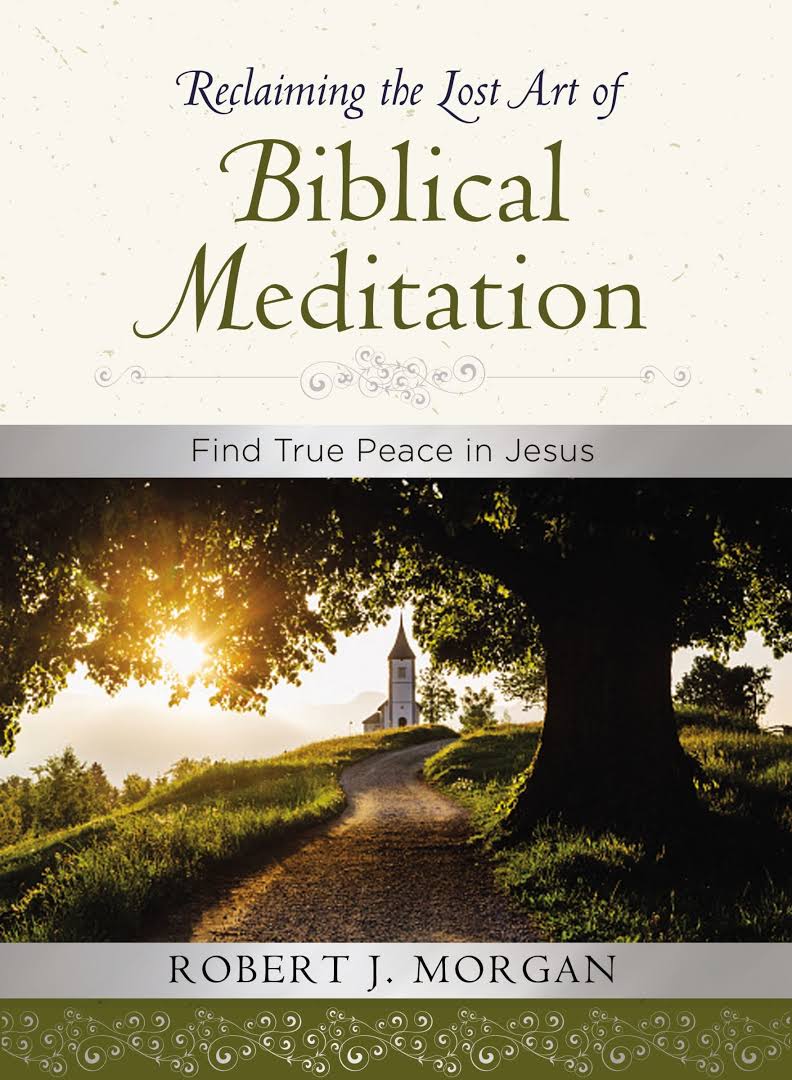
Edited by International Headquarters
Pastor Morgan’s new release,
Reclaiming the Lost Art of Biblical Meditation,
is available through most major booksellers.
St John Ambulance Celebration Service
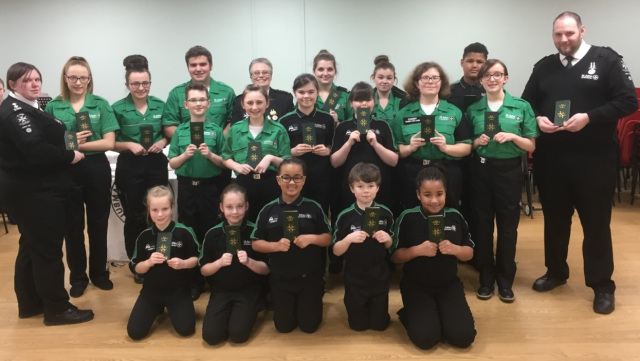
Earlier this year, a service was held at Bentley Pentecostal Church to celebrate 40 years of the St John Ambulance in the villages of Arksey and Bentley near Doncaster. The St John Ambulance group was started originally in Arksey 40 years ago and then moved to Bentley Pentecostal Church around three years ago.
Stephen Anderson, Elder at the Church and Vice Chairman of the Gideons Doncaster Branch says, “We were delighted to be able to help our friends at St John with the use of our Church Community Centre and have enjoyed a good relationship with them which has included joint services together at Christmas and Easter. At the request of the St John Officers, the service included hymns, prayer and modern worship songs led by members of the church worship team.
Gideons have presented Bibles at previous awards ceremonies and were asked if Bibles could be presented at this very special celebration. Thanks to the great help of the team at the Gideons National Office and the kind permission from St John HQ, we were able to provide special celebration New Testaments. These were green to match the St John uniform with their crest printed in gold on the front and the Brigade prayer inside.
The Cadets and Officers received awards from St John for their progress and achievements and Stephen presented Bibles to each one. He was also asked to give a short message focused on the first line of the St John Oath of Chivalry taken by all Officers and Cadets which states, ‘To Serve God’.
Janet Havenhand, the Officer in charge of the St John group was there at the very beginning 40 years ago and received a special Presentation Bible also with the St John Ambulance crest on the front. A second Presentation Bible was sent to be on display in the St John Museum to commemorate the event. The Gideons in Doncaster, along with the Bentley Pentecostal Church, look forward to continuing this relationship with St John Ambulance in the coming months and years.
Submitted by Stephen and Ann Anderson, Doncaster Branch of The Gideons
Veterans testament
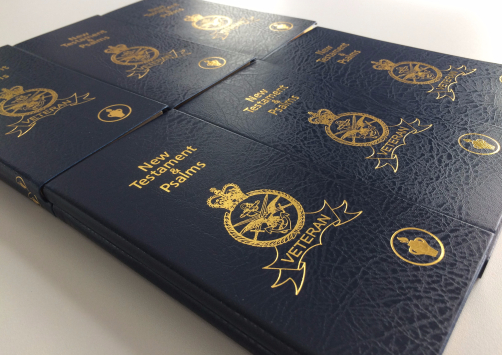
When I was going into the hospital in Irvine, Ayrshire to visit my wife Susan, I was wearing my Veterans Badge and as I was walking down the corridor this man called Joe spotted my badge and said, “Hi! What mob were you in?” Meaning which Regiment was I in. I told him I was in The Royal Scots Fusiliers and asked which Regiment he belonged to and he told me he was part of REME (Royal Electrical Mechanical Engineers).
I said to him, “Before you go I would like to give you this” and I gave him a copy of the Gideons Veterans New Testament & Psalms. I explained to Joe about the Helps section and the Daily Readings at the front of the Testament as well as the Veterans Prayer inside the back pages. I then said that while we are here at the back of the book, if you should make a decision to follow Jesus as your personal Saviour, you can fill in your name and the date in the commitment page. Joe thanked me and went on his way.
Later I met another man named Henry and he also spotted my Veterans Badge and came out with the same question, “What mob were you in?” Again I told him, just as I had done with Joe and he told me he was with a Landing Craft Unit at Normandy. And so the next day I took along another copy of the Veterans Testament and I gave it to him and explained everything I had told Joe.
The next day, before I arrived at the hospital, Henry had spoken to Joe and thanked him for his Veterans New Testament and said how he hadn’t realised there was so much in it, “what a great book” he told Joe.
When I arrived, Joe came up to me and passed on what Henry had told him earlier. I don’t know how Henry had mistook Joe for me but I think it could be down to our similar haircuts, bald and short!
Henry also said he would continue to study it and see what more he could get out of it. So Praise THE LORD and please pray for Joe and Henry.
God bless
Sam Rodger, Ayrshire North Branch of The Gideons
Read the Word
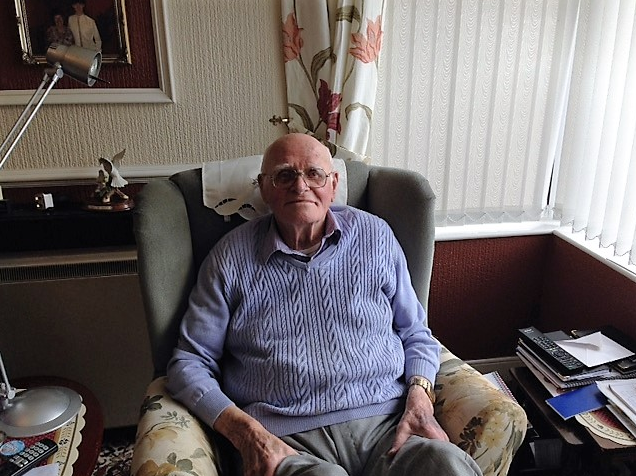
Ronnie, a ninety year old Christian friend, told me recently about an experience he had over 45 years ago when he was attending the Royal Victoria Hospital, Belfast to have his annual check up following an ear operation. For some time he had also been suffering with both vertigo and tinnitus. When he arrived at the hospital, he collapsed when he was just about to see the consultant. Consequently, he was admitted for observation and treatment.
As he did not have his own Bible with him, he opened the bedside locker and found a Gideon New Testament & Psalms in a bracket on the inside of the door. While lying in bed on his back with his eyes closed, he had a panic attack. He had the Bible on his chest when he clearly heard a voice in his head saying, “Read the Word. Read the Word. Read the Word.”
Ronnie ventured to open one eye and found he could focus without the vertigo causing him problems. He then opened the other eye with the same result. He instantly opened the Gideon New Testament & Psalms and his eyes fell on Romans chapter 8 verses 15-18. He found verse 18 especially comforting, “I consider that our present sufferings are not worth comparing with the glory that will be revealed in us.” Ever since this experience, throughout his life Ronnie has returned to this passage of Scripture for assurance and comfort.
Ronnie says, “I shall never forget the blessing I received through reading that Gideon New Testament & Psalms while I was in hospital.” As his sight is now failing, he recently received an Ultra Large Print Gideon New Testament & Psalms for which he is extremely grateful.
Submitted by Sam McEwen, Down North Branch of The Gideons